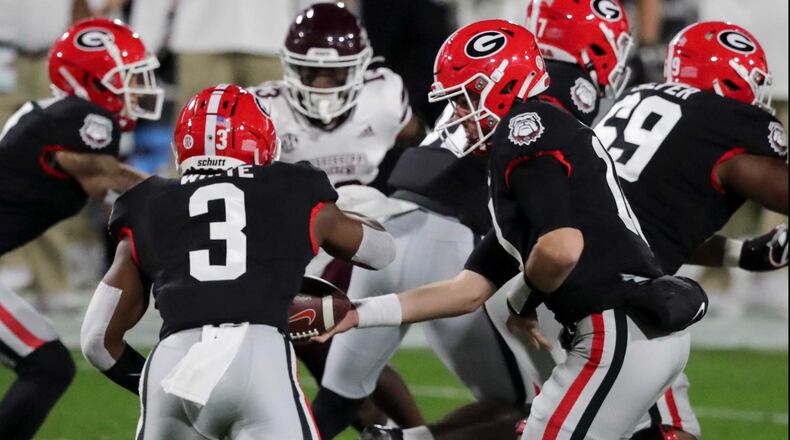With just under seven minutes left in the fourth quarter of No. 13 Georgia’s win over Mississippi State on Saturday night at Sanford Stadium, the Bulldogs got the ball back on their own 18-yard line. Georgia led 31-24 and wanted to run the clock down to prevent Mississippi State from having a chance to tie the score.
Typically, that’s when a team will want to run the ball to take time off the clock. But Georgia had gained 19 rushing yards on 16 carries at that point (not including yards lost on quarterback sacks), and the Maroon Bulldogs’ defensive line had shut down Georgia’s run game all night long.
“We knew the guys ahead (and) up front play really hard and physical,” coach Kirby Smart said. “They do a tremendous job of making you one-dimensional.”
Given the lack of success in the run game to that point, Smart and offensive coordinator Todd Monken dialed up three consecutive passing plays for quarterback JT Daniels. The first two fell incomplete, setting up third-and-long at a key leverage point of the game. If the Bulldogs couldn’t keep the offense on the field, Mississippi State would have plenty of time to work in its attempt to tie the score.
On third-and-10, Daniels found wide receiver Demetris Robertson on a 31-yard completion to around midfield. The drive soon stalled, though punter Jake Camarda was able to pin the Maroon Bulldogs deep in their own territory with a 50-yarder. Georgia successfully ran the ball only twice on that drive, getting six yards from Zamir White and eight yards from Kenny McIntosh.
In the end, Mississippi State wasn’t able to come back and score, but the lack of success on the ground late in the game emphasized the difficulty Georgia had running the ball throughout the night. Georgia running backs gained 33 yards on 18 carries. The final stats showed Georgia with eight net rushing yards on 23 carries (including three sacks for minus-21 yards and four yards lost when Daniels took a knee on the last two plays of the game). The Bulldogs entered Saturday’s game averaging just under 175 rushing yards per game.
“On film, we’ve been such a great run team,” Daniels said. “I think we had to prove ourselves in the passing game a little bit, so they came out and they played a little more cover-zero, no safeties. They played a little more man. Really, I think it was their emphasis to try and stop (White) and (James) Cook from taking it up on them.”
Both Smart and Daniels emphasized the physicality of Mississippi State’s defense and its commitment to stopping the run. Daniels finished with 401 passing yards in his first start — the first Georgia quarterback to pass for more than 400 yards since 2013. He took full advantage of the passing opportunities presented by the Maroon Bulldogs’ emphasis on stopping the run game.
But for a program that’s called itself ‘Running Back U’ in recent years, Saturday’s performance on the ground was a far cry from what’s become a calling card of Georgia football.
“We pass-(protected) better than they pass-rushed, and they run-stopped better than we ran,” Smart said. “I’d reserve judgement until I watch it to see totally what it was, but it wasn’t good enough.”
About the Author
Keep Reading
The Latest
Featured


